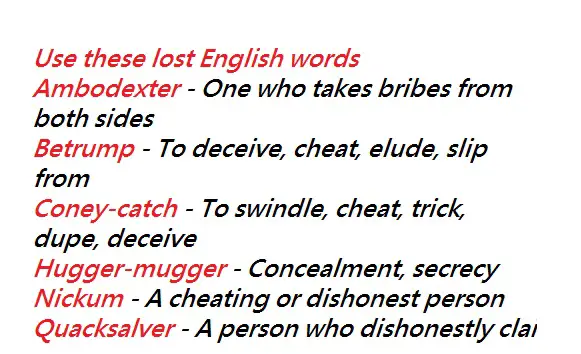Lost English words rediscovered! Don’t be a Momist:
“Will you be my ‘Dowsabel‘?
“Ambodexter caught”
“Thispolitician is a Nickum”
“Guy in white house is a Percher”

Don’t be surprised if you see such headlines in the near future. Because that is exactly what some of the academics and linguists want us to do. Start using these “Lost English Words”.
Partnering with Privilege insurance, they have gone through historical texts and etymological dictionaries and compiled the list of 30 words that we might find useful today.
Dominic Watt senior lecturer in language and linguistic science at the University of York said:
As professional linguists and historians of English we were intrigued by the challenge of developing a list of lost words that are still relevant to modern life, and that we could potentially campaign to bring back into modern day language.
‘To allow people to really imagine introducing these words back into their everyday lives, we’ve chosen words that fit within themes still relevant to the average person.
‘Within these themes, we’ve identified lost words that are both interesting and thought-provoking, in the hope of helping people re-engage with the language of old.’

Here is a complete list of lost English words which are proposed to come back in day-to-day language.
Ambodexter – One who takes bribes from both sides
Betrump – To deceive, cheat, elude, slip from
Coney-catch – To swindle, cheat, trick, dupe, deceive
Hugger-mugger – Concealment, secrecy
Nickum – A cheating or dishonest person
Quacksalver – A person who dishonestly claims knowledge of or skill in medicine; a pedlar of false cures
Rouker – A person who whispers or murmurs; one who spreads tales or rumours
Man-millinery – Suggestive of male vanity or pomposity
Parget – To daub or plaster (the face or body) with powder or paint
Snout-fair – Having a fair countenance; fair-faced, comely, handsome
Slug-a-bed – One who lies long in bed through laziness
Losenger – A false flatterer, a lying rascal, a deceiver
Momist – A person who habitually finds fault; a harsh critic
Peacockize – To behave like a peacock, to pose or strut ostentatiously
Percher – A person who aspires to a higher rank or status; an ambitious or self-assertive person
Rouzy-bouzy – Boisterously drunk
Ruff – To swagger, bluster, domineer. To ruff it out or to brag or boast of a thing
Sillytonian – A silly or gullible person, one considered as belonging to a notional sect of such people
Wlonk – Proud, haughty, rich, splendid, fine, magnificent
Fumish – Inclined to fume, hot-tempered, irascible, passionate
Awhape – To amaze, stupefy with fear, confound utterly
Hugge – To shudder, shrink, shiver, or shake with fear or with cold
Merry-go-sorry – A mixture of joy and sorrow
Stomaching – Full of malignity, given to cherish anger or resentment
Swerk – To be or become dark, gloomy, troubled, or sad
Teen – To vex, irritate, annoy, anger, enrage, to inflict suffering upon
Tremblable – Causing dread or horror
Wasteheart – Used to express grief, pity, regret, disappointment, or concern
Dowsabel – Applied generically to a sweetheart, ‘lady-love’
Ear-rent – The figurative cost to a person of listening to trivial or incessant talk
More Info On- What is a Crinoline, Edwardian Era English Language, Slang Words used in English, Writing Style in the Victorian Era